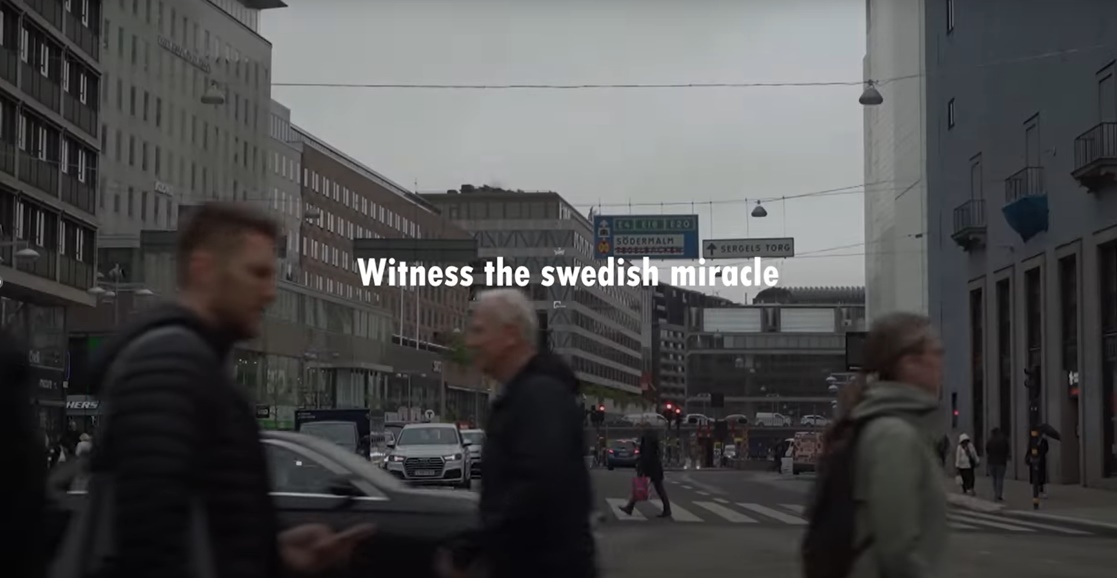
Sweden will be the first to achieve the goal set for EU member states and be recognized as a smoke-free country, i.e. one where less than 5% of the population smokes cigarettes.
The documentary “How Sweden Quit Smoking” by Tomasz Agencki shows the remarkable synthesis of human creativity, innovation and personal responsibility that not only launched Sweden’s success in smoking-related harm reduction, but also points the way for other countries around the world. Sweden’s experience shows that alternative products that allow people to use nicotine in a safer way play a key role in this process.
On June 20, 2024, We Are Innovation (WAI) and the Economic Freedom Foundation (EFF) organized an avant-premiere of the documentary film “How Sweden Quit Smoking,” directed by Tomasz Agencki. The event took place in the Atlantic Cinema in Warsaw.
After the film projection, participants had the opportunity to listen to a debate with the director and special guests, Prof. Maciej Glogowski (thoracic surgeon and oncologist) and Prof. Marcin Wojnar (psychiatrist, expert in addictions). The discussion was moderated by Marek Tatala, president of the EFF.
First Smoke-Free Country
The documentary created by Polish filmmaker Tomasz Agencki, “How Sweden Quit Smoking,” delves into Sweden’s remarkable journey toward becoming a smoke-free country. Sweden is the country with the smallest percentage of smokers in the European Union – it is less than 6% of the population today.
In contrast, according to a study by the Polish Academy of Sciences, nearly 29% of Poles smoke cigarettes every day, and recent years have seen an upward trend. Sweden will be the first to reach the target set for EU member states and be recognized as a smoke-free country, i.e. one where less than 5% of the population smokes cigarettes. The rates found in Sweden translate into the lowest rates of cancer and other smoking-related conditions in the EU.
This unprecedented achievement in modern times, positively translating into health indicators in Swedish society, was not achieved with bans and subsequent restrictions, but by innovation and access to proven alternative nicotine products.
In the film, we are introduced to a rich array of points of view – from prominent scientists and doctors to innovators, activists, and artists. Each voice shows how important the interplay of science, public policy, innovation, and personal determination is for the situation in Sweden. This is far more effective than prohibitions and paternalistic regulations.
Tomasz Agencki’s film shows the remarkable synthesis of human creativity, innovation, and personal responsibility that not only sparked Sweden’s success in reducing smoking-related harm but also points the way for other countries around the world. “Other products such as snus, vaping, heated tobacco or nicotine pouches are much less harmful because they don’t contain all the tar that is in cigarettes”, states Dr. Anders Milton, a physician and former chairman of the World Medical Association Council, in the film.
Watch the official trailer on YouTube
Swedish Experience And Public Policy
Participants in the debate, which took place immediately after the film, reminded that it is not nicotine that causes cancer and other diseases associated with smoking traditional cigarettes. At the same time, nicotine, like many other psychoactive substances people use, is an addictive substance. Thanks to product innovations, we now have alternative products available that contain nicotine while being safer for consumers.
“In the film there was repeated mention of something called harm reduction. This is an extremely important approach for addicts who are unable to quit using the substances they’re addicted to (…). All those products with which we can replace cigarette smoking increase chances of quitting”, pointed out Prof. Marcin Wojnar, a psychiatrist and head of the Department of Psychiatry at Medical University of Warsaw.
Prof. Maciej Glogowski, a thoracic surgeon and surgical oncologist, head of the Surgical Unit of the Lung and Chest Cancer Clinic, Maria Skłodowska-Curie National Research Institute of Oncology in Warsaw, stated:
“We will not transfer the Swedish model entirely to Poland. The film shows that Swedes have known snus for more than 200 years. But it is one of alternative nicotine products, recognized by the FDA in the United States as modified risk tobacco products, i.e. products with a modified risk of diseases that normal cigarette smoking causes. And this is the direction in which Polish and European policy should go, to consider creating our own model that pays attention to harm reduction.”
Prof. Marcin Wojnar also reminded that the percentage of smokers in Poland remains high:
“In our country, decision-makers still do not accept the approach in the spirit of harm reduction, which is that addicts could switch to alternative ways of delivering nicotine, to those products that can reduce deaths in Poland from cigarette smoking.”
Prof. Maciej Glogowski also pointed out the existence of the Bureau for Chemical Substances in Poland, which should study each of the alternative products, and the results of the studies should be made public and form the basis for conducting public policy.
Director Tomasz Agencki asked:
“Before making the film, I didn’t know these statistics, and I was surprised, because every time we had interviews about nicotine addiction and the negative effects of cigarette smoking, I heard that Swedes have this problem solved thanks to innovations and alternative products. Why isn’t this obvious to everyone?”
Federico Fernandez, CEO of We Are Innovation, said:
“We are extremely excited to bring this important documentary to a wide audience. How Sweden Quit Smoking beautifully embodies innovation that solves problems and benefits society. We hope that the Swedish experience will catalyze similar life-saving innovations around the world.”
Continue exploring:
Punitive Policies Only Hurt Smokers, Including Those Trying to Quit























